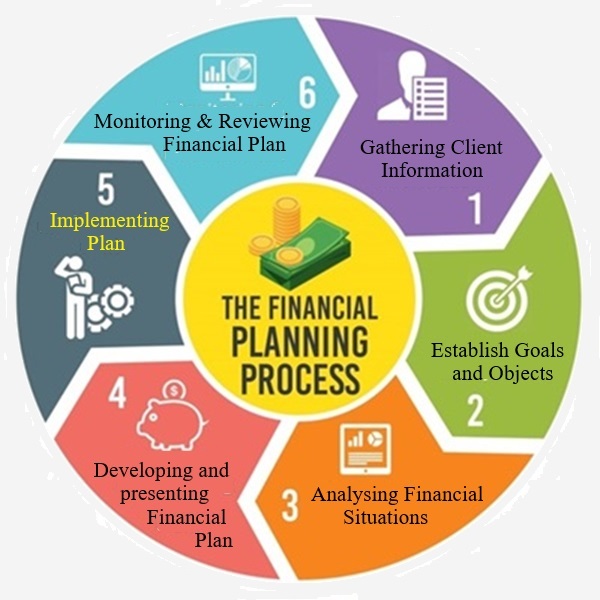

Financial planning is a process of understanding the future financial requirements and making provisions for them accordingly. It does not start and end in a specified time frame. Hence, it will not be wrong to say that it is ongoing. it is the process of knowing the current financial standing, and understanding where an individual wants to reach by charting out the way and taking appropriate steps to attain their goal. But like any other plan, a financial plan also needs to be reviewed from time to time to understand whether they are off track and to take corrective measures for the same. Every individual works hard to earn money to save for their family’s future requirements, but only keeping is not enough. Investing the saved cash into appropriate and suitable investment options is the key to securing the financial future. Different individuals have different requirements depending upon their income, expenses, and risk appetite. At the onset of a career, a person can take more risks than those with more responsibilities. Therefore, different investment options catering to the varied needs of people are readily available in the market. Investment options include stocks, equity, and debt, serving diverse requirements such as accessible liquidity, regular income, cash flow, and a capital increase. A holistic financial plan guards short-term as well as long-term financial requirements. It also helps teach the golden habit of saving and determining whether an individual needs a particular asset. As Warren Buffet rightly said about spending and savings,” If you buy things you do not need, soon you will have to sell things you need,” and,” Do not save what is left after spending, but spend what is left after saving. Let us understand what financial planning is and how can it benefit us? In layman’s language, financial planning continuously evaluates the financial position and invests accordingly, keeping the goals or objectives in mind. Sounds easy. Each one has different life goals to be achieved in varying stages of life. Let us understand how to formulate plans and the steps in attaining them.
It starts with establishing short-term, medium, or long-term goals.
• Does anyone want to be a millionaire before turning 40?
• Does anyone want to keep a buffer for harder times in life?
• Does anyone want to pre-plan for all future expenses like marriage, child’s education, and retirement?
The answer lies in getting an objective and sound financial plan in place for everyone.

The next step involves correctly evaluating the assets and liabilities, what they currently own and what plan to own in the future. That gives a clear understanding of the net worth and the current financial position vis-à-vis the objectives. In addition, it provides an idea of how far one is from the goal and the run rate to achieve the desired objective. In other words, it helps determine the expected rate of return in the required number of years needed for attaining the set financial goal.
The third step in creating a sound financial plan is to develop a road map for the objectives. The essence of creating a financial plan is to consider the short, medium, and long-term objectives. Then, investment is made accordingly in options that do not hamper liquidity for the short-term and medium-term. Whereas, for the long term investment, chances are chosen to keep the long-term perspective that usher increased invested capital.
It makes for a good financial plan if reviewed from time to time after implementation. Implementation is the key to achieving goals but along with it, what holds more importance is to keep checking the plan periodically. Financial planning is not static; it is an ongoing process that requires monitoring and reviewing financial decisions, at the very least, yearly. As they say, if one cannot control their finances, they will restrain them. Financial planning is about being clutter-free and organized. It involves classifying the goals into short, medium, and long term and making provisions for them, keeping the cost of inflation in mind, and providing any untoward incident that might occur in the future. It provides you with a sense of security and confidence in dealing with whatever the end has in store for you more easily and lessens anxiety.

Financial planning is a very beneficial practice. Without sound financial planning, one can miss out on important life goals. It provides a roadmap to achieving financial goals and reduces uncertainty about the future by managing your money to achieve personal monetary satisfaction. A holistic financial plan can increase one’s quality of life and provide the following benefits:
1. It provides a sense of freedom as far as financial anxiety concerns investing properly to attain life goals easily through early anticipation of expenses and investment. It is an attempt to be future-ready and achieve personal financial plans simultaneously.
2. It provides an increased sense of awareness and control of financial goals. In addition, since individuals are completely in control of their expenses, it saves them from facing unwarranted debt or reliance on others for financial stability or even bankruptcy in certain cases.
3. The most important function of financial planning is safeguarding the economic future, thereby protecting personal relationships. A sense of security for the family members leads to enhanced personal connections and less trouble in the future.
4. It also provides a comprehensive roadmap for future obligations, thereby obtaining and protecting financial resources.
5. It helps monitor spending and expenses by planning your tax expenses, maintaining budgets, and increasing cash flow.
6. It provides a better financial understanding of the current economic condition and what it may take to maintain the same standard of living in the future. Appropriately investing money in the current financial options can save for the future depending upon the objectives and risk appetite.
7. It helps understand whether one needs a particular asset at a given point in time or not. So often, individuals accumulate unnecessary assets to cushion their current standard of living, thereby putting more pressure on their expenses. A good and sound financial plan helps avoid making such mistakes.
There is a myth that financial planning is for people with surplus money. On the contrary, a well-planned and holistic financial planning process can benefit everyone. It provides savings, investments, planning for education, major purchases, retirement, insurance, and other financial needs.
According to forbes.com, only 31% of financial decision-makers in families say they have created a comprehensive financial plan either on their own or with professional help. It also states that 35% of people have a plan to save for emergencies and only two-thirds have a plan to meet any of the six savings goals, such as emergencies, retirement, a child’s education, or a down payment on a house.
Financial plans are designed for people from all walks of life, irrespective of their earning level. However, most people opine that financial goals are for the older ones. That is a complete myth. If individuals keep investing early, they will better achieve life goals than many peers. Most millionaires and billionaires are the ones who got hooked on financial planning at an early age and kept track of their financial decisions.
One of the biggest mistakes made is not to invest early. Investing at the onset of a career provides large scope for any gaps that might occur in the future. It also helps in determining spending habits. One can manifold their savings by making simple lifestyle changes and refraining from high-rate loan debt, such as credit cards.
The easiest mantra to conjure up savings is to save first and spend later.
A healthy financial plan suits the requirements of a particular individual, considering the monetary standing at that specific time. For example, a financial plan for a person in his 20s would be completely different from the one in his 40s.
Just at the onset of a career, a financial plan would incorporate long-term savings primarily into retirement funds or increase the contribution to the 401(k) plans. It is more important for individuals to comprehend the importance of saving and spending wisely. It is also essential to have ample liquidity by maintaining at least six months’ salary in a fund for any unwarranted situation.

Empower the workforce to reach for their financial goals and navigate life events through personalized one-on-one guidance, digital tools and workplace solutions. The benefits of CF Banque workplace financial planning program; help create a more productive, financially well and engaged workforce.
We provide expertise and resources to help create a workforce that is less stressed about finances and more focused on driving business.
Acting as an extension of your HR and benefits team, we help to increase awareness of your company’s compensation and benefits.
We apply a holistic approach to corporate risk management by assisting in adherence to company procedure, regulatory policy and tax laws.
Americans are too worried about their finances today to think about planning for the future.1
Return to home page for more topics
Transforming insights into opportunities that are tailored to your investing needs across public and private markets
Premier advice, solutions, and service for select individuals and institutions
While buying a large amount of different stocks requires a sizeable budget and would be time-consuming. However, products such as ETFs make it possible to do this in a simple and cost friendly manner.
with our experts team, invest in stock markets and avoid high risk.
Insights, analytics, platforms, and client service combine to offer unmatched execution
Embedding our developer solutions into our clients’ ecosystem so they can unlock CF Banque’ 150 years of financial expertise
Differentiated insights and timely perspectives from our expert analysts
Helping clients build a treasury of the future and powering software partners to enhance their offerings